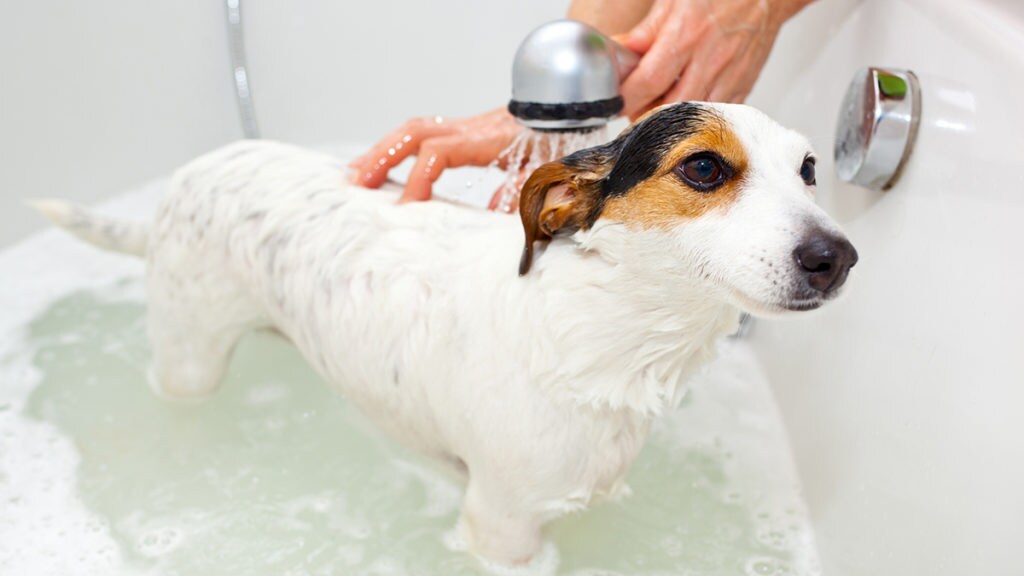Some dog skin problems are caused by conditions that require more than your typical soothing oatmeal and shea butter dog shampoo. If this sounds like the case for your four-legged friend, a medicated dog shampoo might help.
Read on to learn more about medicated dog shampoo, what problems it helps, and—if your pal needs one—how to find some through your favorite dog supplies resource.
What Is Medicated Dog Shampoo?
Medicated dog shampoo is formulated for dog skin problems. It contains special ingredients to address specific skin conditions, says Melissa Bain, DVM, a professor of clinical medicine and epidemiology at the UC Davis School of Veterinary Medicine in California.
“Certain medicated shampoos are made just for pets with skin problems, like skin infections,” she says.
Like most dog shampoo, medicated shampoos typically have a base of water, surfactants and emollients, Dr. Bain says. Additional ingredients—such as special medications used to treat dog skin problems—are added to help the particular condition.
“It’s important that the [medicated] shampoo is applied evenly to the hair/coat after being diluted in water,” Dr. Bain explains. “And keep it on the dog’s skin for 10 minutes before rinsing thoroughly.”
Why Would a Pup Need Medicated Dog Shampoo?
Treatments for skin conditions often are applied to the skin surface. If your dog has a fungal infection, a bacterial infection or a parasite problem, Dr. Bain says that your veterinarian may recommend a medicated dog shampoo that includes antifungal, antibacterial or antiparasitic ingredients. However, depending on the severity of your dog’s skin condition, your veterinarian may recommend additional treatment beyond medicated dog shampoo.
The three most common reasons why a dog would need medicated dog shampoo are ringworm, hot spots and mange.
1. Ringworm
Ringworm (dermatophytosis) is a type of infection caused by the fungus Microsporum canis, Microsporum gypseum or Trichophyton mentagryphytes. It is caused by yeast or fungal overgrowth on a dog’s skin.
This fungal infection might cause your dog’s coat to fall out in spots with scaly patches of skin remaining. If your veterinarian thinks your pal has a fungal infection like ringworm, she’ll likely recommend a medicated dog shampoo or dip with antifungal medicine to treat his coat, as well as a thorough cleaning of his environment and bedding.
2. Hot Spots
If your pal has hot spots or skin problems that haven’t gone away, he might have a bacterial infection like pyoderma. A medicated dog shampoo with benzoyl peroxide, chlorhexidine or other antibacterial ingredient can ease your pet’s pain by removing bacteria, crusts and scales, and reducing the odor and oiliness associated with the dog skin problem. Your veterinarian can recommend the right formula for your pet’s particular problem.
3. Mange Mites
Like fleas and ticks, mites are parasites that live on a dog’s skin. Certain types, like Demodox canis mites and Sarcoptes scabiei var. canis, can cause mange, a skin condition that creates intense itching, crusty sores, hair loss and secondary infections. If your veterinarian suspects a mite infestation, she’ll likely include a medicated dog shampoo or dip with antiparasitic ingredients in your pet’s treatment program.
If at any time you notice something suspicious on your pet’s skin or coat, schedule an appointment with your veterinarian.
“If there’s an odor, matted or greasy fur, or overly flaky skin, go to the vet,” Dr. Bain says.
How to Get Medicated Dog Shampoo?
Medicated dog shampoo is available both by prescription or over-the-counter, depending on the active ingredients and their strength. Consult with your veterinarian about the right medication and formula for your pet. If your veterinarian suggests an over-the-counter version, check out some of options below.
- Antifungal Dog Shampoo: If you need a soothing shampoo to relieve symptoms of fungal infections, like ringworm and scaling, consider Davis Miconazole dog and cat shampoo, which contains 2 percent miconazole nitrate and 2 percent colloidal oatmeal.
- Antibacterial Dog Shampoo: Containing 2 percent chlorhexidine gluconate, the Davis Chlorhexidine dog and cat shampoo helps battle bacteria that cause skin problems. It is formulated to be mild enough for use as an everyday shampoo.
- Antifungal and Antibacterial Dog Shampoo: Formulas like GNC Pets anti-bacterial and anti-fungal medicated dog shampoo combine antibacterial and antifungal ingredients to combat two problems at once.
- All Natural Essential Oils: If you prefer a natural approach to fungus and bacteria control, consider a shampoo like the Fieldworks Moosh dog shampoo with neem & argon oil, which has ingredients like neem oil, argon oil and bentonite clay that are designed to bind with toxins and pull them away from the dog’s skin.
Does your dog need a medicated shampoo? Your best bet is to first check with your vet, because a small infection or infestation can turn in a big problem in no time!
Share:












